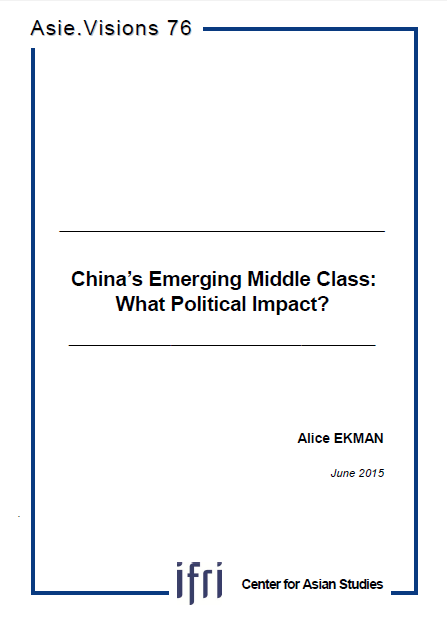China’s Emerging Middle Class: What Political Impact?

This research paper argues that, contrary to what is often believed, most of the Chinese middle class appears to be politically conservative, and may not challenge the current political order as much as is expected, for several reasons; first of all, because of its strong connection to the Communist Party of China and the civil service in broader terms. Nonetheless, Chinese middle households are increasingly voicing their concern about a set of issues directly affecting them, such as pollution, either in the street or online.
They also appear to be reluctant to accept some aspects of the ongoing socioeconomic reform under the Xi Jinping leadership, such as the flexibilization of the hukou system, or may feel unfairly targeted under the anti-corruption campaign (see part III). In conclusion, this research paper provides an overall assessment of the political impact of the emergence of China’s middle class, by taking into account the evolution of the profiles and expectations of this population group, as well as the new media landscape and the latest decisions and reactions in the early Xi era. It aims not only at understanding if China’s middle class is hoping (or not) to change the current political system, but also if it would be able to do so in the present context.
This study follows a first research paper on the Chinese middle class, titled “The Distinctive Features of China’s Middle Classes” (see below) which identified, beyond income classification, major specificities of this population group in China.
Download the full analysis
This page contains only a summary of our work. If you would like to have access to all the information from our research on the subject, you can download the full version in PDF format.
China’s Emerging Middle Class: What Political Impact?
Related centers and programs
Discover our other research centers and programsFind out more
Discover all our analysesJapan’s Takaichi Landslide: A New Face of Power
Prime Minister Sanae Takaichi has turned her exceptional popularity into a historic political victory. The snap elections of February 8 delivered an overwhelming majority for the Liberal Democratic Party (LDP), driven by strong support from young voters, drawn to her iconoclastic and dynamic image, and from conservative voters reassured by her vision of national assertiveness. This popularity lays the foundation for an ambitious strategy on both the domestic and international fronts.
The U.S. Policy Toward Taiwan Beyond Donald Trump: Mapping the American Stakeholders of U.S.-Taiwan Relations
Donald Trump’s return to the White House reintroduced acute uncertainty into the security commitment of the United States (U.S.) to Taiwan. Unlike President Joe Biden, who repeatedly stated the determination to defend Taiwan, President Trump refrains from commenting on the hypothetical U.S. response in the context of a cross-Strait crisis.

China’s Strategy Toward Pacific Island countries: Countering Taiwan and Western Influence
Over the past decade, China has deployed a diplomatic strategy toward the Pacific Island Countries (PICs). This strategy pursues two main objectives: countering Taiwan's diplomatic influence in the region and countering the influence of liberal democracies in what Beijing refers to as the "Global South."

Opening up the G7 to South Korea to Address Contemporary Global Challenges
The G7’s global influence has diminished as powers like China reshape international governance through initiatives such as BRICS and the Shanghai Cooperation Organisation (SCO). With the G7 now representing just 10 per cent of the world’s population and 28 per cent of global GDP, its relevance is increasingly questioned.











